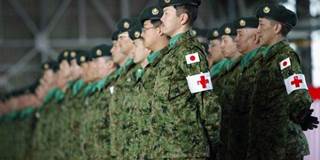Domestic opposition to Japanese Prime Minister Shinzo Abe's effort to alter Japan's defense posture, though broad, does not run very deep. Voters, it seems, are less concerned about the direction Abe is taking the country than about the need to turn around a moribund economy.
WASHINGTON, DC – In February, Japanese Prime Minister Shinzo Abe called on the National Diet to amend Article 9 of the country’s constitution, which renounces war as a means of settling disputes. Drafted by the United States after World War II, the constitution contains “some parts [that] do not fit into the current period,” Abe said. He is particularly concerned with the constitutional provision that prohibits Japan from maintaining “land, sea, and air forces,” arguing that it seems to be in direct contradiction with the existence of the country’s Self-Defense Forces.
At a glance, Abe’s proposal seems deeply unpopular. According to one poll, some 50.3% of the Japanese public objects to amending Article 9. Only 37.5% of those polled favor such action. The good news for Abe, however, is that opposition to his efforts, though broad, does not seem to run deep. Voters, it seems, are less concerned about the direction Abe is taking the country than they are about his decision to make the issue a top priority.
Revising the constitution would provide stronger legal grounding for Abe’s controversial defense measures. Introduced last year, the new legislative provisions lift restrictions on deploying Japanese forces overseas and expand the definition of self-defense to include aiding an ally. These, too, are unpopular – at least superficially. Some 51% of Japanese voters disapprove of the measures, compared to 30% who support them. And yet only 38% say they would like to see Abe reverse course and repeal the legislation.

WASHINGTON, DC – In February, Japanese Prime Minister Shinzo Abe called on the National Diet to amend Article 9 of the country’s constitution, which renounces war as a means of settling disputes. Drafted by the United States after World War II, the constitution contains “some parts [that] do not fit into the current period,” Abe said. He is particularly concerned with the constitutional provision that prohibits Japan from maintaining “land, sea, and air forces,” arguing that it seems to be in direct contradiction with the existence of the country’s Self-Defense Forces.
At a glance, Abe’s proposal seems deeply unpopular. According to one poll, some 50.3% of the Japanese public objects to amending Article 9. Only 37.5% of those polled favor such action. The good news for Abe, however, is that opposition to his efforts, though broad, does not seem to run deep. Voters, it seems, are less concerned about the direction Abe is taking the country than they are about his decision to make the issue a top priority.
Revising the constitution would provide stronger legal grounding for Abe’s controversial defense measures. Introduced last year, the new legislative provisions lift restrictions on deploying Japanese forces overseas and expand the definition of self-defense to include aiding an ally. These, too, are unpopular – at least superficially. Some 51% of Japanese voters disapprove of the measures, compared to 30% who support them. And yet only 38% say they would like to see Abe reverse course and repeal the legislation.